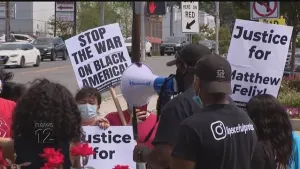More Stories
Trevon Jenkins is a 19-year-old college student from Southampton who is also a member of the Shinnecock Indian Nation.
Jenkins spoke at several protests out east and talked to News 12 about whether his voice and others like his are being heard and listened to.
"I think that my age group, the people younger and some, some older are genuinely, wholeheartedly not only listening, but trying to help and do. But there are some that are way older that we just, we won't be able to fully change their mindset, but we can ask them to sit down and help them learn our mindset, so I do think our voices are being heard, yes," said Jenkins.
MORE: Reflections on Race: 'I am hopeful that we are dismantling the racism that lives within systems'
MORE: Reflections on Race: 'Our fear's a real fear because we know the odds of something happening'
MORE: Reflections on Race: 'Our fear's a real fear because we know the odds of something happening'
When Jenkins protests, he's objecting to an entire system.
"I'm objecting to a system and I'm objecting to the system I've seen my entire family, not entire as in like my close family, but just the people around me on my Indian reservation, fail and they go into a system where, some don't even make it past the 10th grade and we wonder why that is," said Jenkins. "Like why is our school not stepping up? Why is our police, instead of profiling, not questioning them and helping them? Like some people don't have father figures in their life, so why aren't these police officers trying to help in that aspect? Instead we're not and like, we all had a part in that problem, so now we all have to step in and face that problem. That's where my heart is, we gotta really push and change it, like we can no longer just say, we have to do and we will do. And I see it happening all around."
Jenkins describes the Southampton protests as "on and off."
"The atmosphere has been on and off, and I'm going to say on and off, because the on is that everyone is going and everyone is reposting, but the off is that the energy isn't where it should be," says Jenkins. "And when you're protesting, you're objecting to something. And when you're objecting to it, you should feel that in your heart, like you're objecting to it. And I feel people just go to stand and say that they did it, instead of objecting to what we know is wrong."
MORE: Reflections on Race: 'Out here, people are very afraid to speak up'
MORE: Reflections on Race: 'Take off your colorblind glasses and look at the harm'
MORE: Reflections on Race: 'Take off your colorblind glasses and look at the harm'
Jenkins discussed a specific dynamic he says exists in some Black families, when it comes to parents dismissing the problems of their children because they are young and "don't pay bills."
"It can't just be us pushing the outside to change, when we need to fix things on the in too, and that is with how we treat each other and how our parents treat our children," said Jenkins. He plans to start a nonprofit for young people on Long Island that is focused on "giving the minority community a voice."
Jenkins says he was not treated fairly at Southampton High School and mentioned two incidents from high school during which Jenkins says he was called the N-word. Jenkins says he was not treated fairly by the school in either situation - one in-school incident and a second incident that happened outside school but had ramifications there. Jenkins says one incident happened when he was campaigning for student council president - he says a Caucasian student said he wouldn't vote for an N-word. Jenkins says he reported it but the student was not suspended, claiming the school told him he "couldn't confront him." But Jenkins says he should have.
"But as a 16-year-old mindset, running for something so serious at the time, it's like, 'I don't want to ruin this for me.' But no. That's what I have to teach my younger brother and all my other cousins. No, enough is enough. That should have been enough. That should have been an expelled student right there, but instead it was a slap on a wrist."
Jenkins says that situation "wasn't the first or the last time" he was called the N-word. He also described a situation with a close friend at the time, who was intoxicated outside of school. Jenkins says he was caring for his friend and bringing the friend home because "the people who were around didn't like his energy." He says the friend fought him as he was taking him home and called him the N-word. Jenkins says he reacted negatively and responded physically, though he regrets it. But he says in that moment enough was enough, and it hurt coming from a close friend. Jenkins says the situation spilled into school because he was class president, and the other boy's lacrosse coach spotted bruises on his face. Jenkins says he was removed from his presidency instead of the other boy facing any consequence - no questions asked.
Dr. Nicholos J. Dyno, superintendent of schools, issued a response to Jenkins claims and said, "The Southampton Union Free School District does not comment on individual student discipline matters. However, the district takes all disciplinary incidents very seriously and follows Board of Education policy and protocols when addressing such matters. The allegations being made by a former student are not accurate and the district does not tolerate racism or racist behaviors in any capacity."
More from News 12
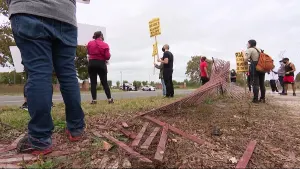
Long Island group gathers at Brentwood State Park to demand justice for Breonna Taylor
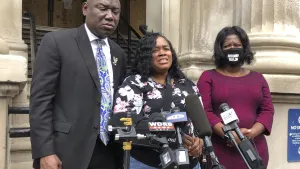
City to pay millions to Breonna Taylor's mom, reform police
2:46
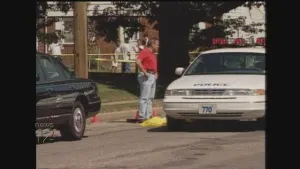
Nassau District Attorney's Office to reinvestigate 1998 Hempstead police-involved shooting
1 day, 11 hours
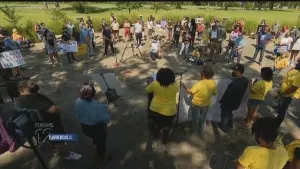
Protesters hold rally outside of Dennison Building in Hauppauge to fight for police accountability
21:27:47
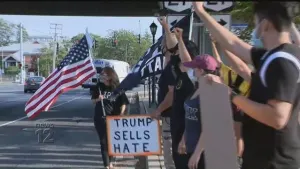
Merrick rally demands justice for Jacob Blake, Black man shot 7 times by Wisconsin police
1 day, 15 hours
